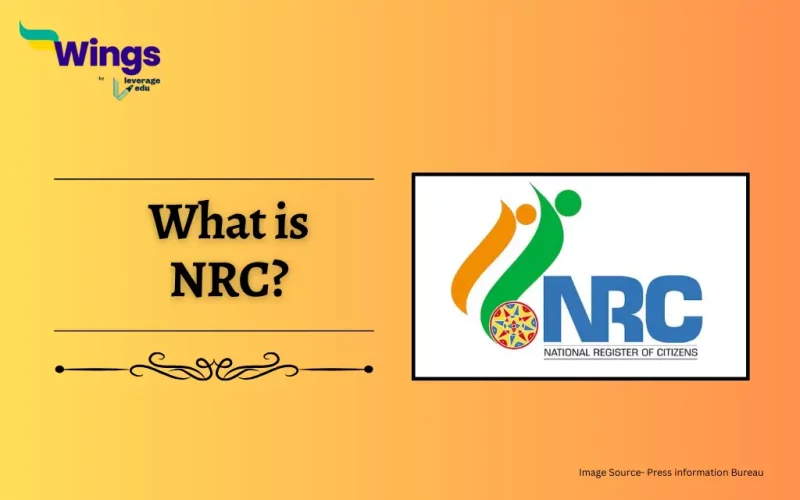NRC is the National Register of Citizens which includes the names of all authentic Indian citizens living in a particular state or territory. Moreover, in 1951 NRC was first created as a record of citizens after the census that took place that year. Additionally, the purpose of the NRC is to record people who can verify their Indian citizenship. Furthermore, it is done to distinguish citizens of India from illegal immigrants or foreigners living in India without proper documentation.
Table of Contents [show]
Who is Eligible for NRC?
In addition, to be eligible for the NRC, a person must meet the following criteria:
- 1972 NRC or Electoral Rolls: Anyone whose name was listed in the NRC of 1972 or any Electoral Rolls until midnight on the 24th March 1971, along with their descendants qualifies.
- Registered with FRRO: People who have registered with the Foreigners Registration Regional Officer (FRRO) according to Central Government rules.
- Moreover, they have not been classified as illegal migrants or foreigners by any authority are eligible.
- Migration to Assam: Additionally, people who migrated to Assam between the 1st of January 1966 and the 25th of March 1971 fall under the eligibility criteria.
- Original Inhabitants of Assam: Those who are the actual inhabitants of Assam, as well as their children and descendants who are Indian citizens, are eligible. However, only if their citizenship is verified by the registering authority.
- Valid Documents: Applicants must be able to provide any one of the documents issued before midnight on the 24th of March 1971, as listed in the approved documents for citizenship.
Also Read: How to file Public Interest Litigation?
What is the National Register of Citizens for Assam?
The NRC in Assam aims to identify illegal migrants who came from Bangladesh after the 24th of March 1971. Its goal is to confirm the authenticity of people who are claiming Assam citizenship.
- Furthermore, to qualify applicants must have family names listed in the 1951 NRC or electoral rolls until the 24th of March 1971.
- To prove citizenship, one can submit documents such as:
- Birth certificates.
- LIC policies.
- Refugee registration certificates.
- Land records.
- Government-issued IDs like citizenship certificates, passports, or licences.
- Bank accounts as well as residential certificates.
- Employment records, educational certificates, and Court documents are also acceptable.
In 1950, Assam saw substantial migrations, hence raising worries among the original inhabitants about preserving their cultural identity and the State’s demography. As a reaction, in the late 1970s, the Assam Agitation emerged which was led by university students and the All Assam Students’ Union. Furthermore, this movement demanded the detection and deportation of illegal migrants. Thus, leading to protests and a halt across Assam.
Also Read: 7 Must-Have Documents for CAA Citizenship (Amendment) Act 2019
What is NRC in Manipur?
NRC in Manipur is the proposed implementation of the NRC in the state. Consequently, the Manipur assembly has passed a resolution urging the Central government to implement it.
Moreover, here is the background:
- There are concerns about illegal immigration from neighbouring countries that is affecting the indigenous population of Manipur.
- Additionally, the State government has suggested 1961 as the base year for specifying citizens of Manipur.
- Furthermore, some tribal organizations have hesitancy about the cut-off year and want it to be 1951.
- Nonetheless, the NRC process has been controversial in other parts of India, thus there is debate about the implementation of NRC in Manipur.
Also Read: What is Section 498A?
Why NRC is Opposed?
In addition, the NRC is criticized for the following reasons:
- Potential for Disenfranchisement: The process might exclude legitimate Indian citizens, especially Muslims, due to a lack of documentation or bureaucratic hurdles. Therefore, this could render them stateless.
- Discriminatory Intent: Moreover, some believe the NRC, along with the Citizenship Amendment Act (CAA), targets Muslims in particular. The CAA proposes a path to Indian citizenship for non-Muslims from neighbouring countries, but not Muslims.
- Logistical Challenges: The NRC process has been criticized for being unmanageable as well as expensive.
- In Assam, where NRC was implemented, nearly 2 million people were excluded, thus causing social unrest.
- Privacy Concerns: Furthermore, the process requires submitting documents and personal information, hence raising concerns about data privacy and misuse.
Also Read: What is Constitutional Morality?
What are the Consequences of NRC?
Moreover, the consequences of NRC are:
- The NRC aims to refine the actual count of illegal migrants in Assam and across India, putting an end to speculation.
- This verified dataset will serve as a foundation for informed debates and the implementation of precise policy measures.
- The release of the updated NRC is a restraint for potential migrants from Bangladesh, hence discouraging them from entering Assam through illegal methods.
- Furthermore, with strict documentation requirements, illegal migrants will face challenges in getting Indian identity documents. Thus limiting their access to the rights and benefits of Indian citizenship.
- Consequently, the draft of NRC’s publication has mentioned that residing in Assam without proper documentation may lead to deportation or detention.
Related Blogs
| How Many Schedules are there in the Indian Constitution? | What is the 9th Schedule of the Indian Constitution? |
| How many Parts are there in the Indian Constitution? | What is Dearness Allowance? |
Lastly, we hope you liked our blog and gained an understanding of What is NRC or National Register of Citizens. Moreover, you may even read more blogs and empower yourself with knowledge regarding Civics and Polity!
 One app for all your study abroad needs
One app for all your study abroad needs















 45,000+ students trusted us with their dreams. Take the first step today!
45,000+ students trusted us with their dreams. Take the first step today!
